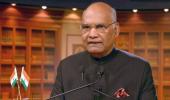Inflation has reappeared as a global issue in both advanced and emerging economies and India needs to be wary of "imported inflation", especially due to high oil prices, according to the Economic Survey 2021-22 released on Monday.

"Inflation has reappeared as a global issue in both advanced and emerging economies.
"India's Consumer Price Index inflation stood at 5.6 per cent YoY in December 2021 which is within the targeted tolerance band," the survey report presented in the Parliament by Finance Minister Nirmala Sitharaman noted.
"Wholesale price inflation, however, has been running in double-digits.
"Although this is partly due to base effects that will even out, India does need to be wary of imported inflation, especially from elevated global energy prices," it said.
Wholesale inflation based on Wholesale Price Index (WPI), after remaining very benign during the previous financial year on account of pandemic induced weakening of economic activity, record low global crude oil prices, and weak demand, witnessed a sharp uptick, rising to 12.5 per cent during April-December period of the current financial year.
While WPI inflation has been higher in the current financial year compared to the previous year in all the three major groups, it was above 20 per cent in 'fuel and power' group reflecting the high international petroleum prices as mentioned earlier.
Within the primary articles group, 'crude petroleum & natural gas' sub-group has witnessed very high inflation and stood at 55.7 per cent in December 2021.
Similarly, minerals have witnessed high inflation throughout the year.
The impact of rising international prices in WPI manufacturing was clearly visible, especially in manufacture of basic metals.
Retail inflation, as measured by Consumer Price Index stood was slightly above 6 per cent in 2020-21 owing to supply chain disruptions caused by COVID-19 restrictions, lockdowns, and night curfews, moderated during the current financial year.
Retail inflation during 2021-22 (April-December) stood at 5.2 per cent.
During the current financial year, retail core inflation (inflation excluding 'food and beverages' and 'fuel and light' - the transitory components of the index) has shown a rising trend.
Average core inflation for the period April-December 2021 stood at 5.9 per cent as against 5.4 per cent in the corresponding period last year.
Unlike 2020-21 (April-December) when 'food and beverage' drove inflation, during 2021-22 (April to December) the major drivers of retail inflation have been miscellaneous and 'fuel and light' group.
The contribution of miscellaneous group has increased from 26.8 per cent in 2020-21 (April-December) to 35 per cent in 2021-22 (April-December) and the contribution of 'fuel and light' increased from 2.3 per cent to 14.9 per cent.
On the other hand, during the same period, the contribution of 'food and beverages' declined from 59 per cent to 31.9 per cent.
Within 'miscellaneous group', sub-group 'transport and communication' contributed the most, followed by health.
India imports around 60 per cent of its consumption of edible oils, and palm oils (crude + refined) constitute around 60 per cent of the imports of edible oils.
As a result, fluctuation in imports and international prices transmit to domestic prices of edible oil.
"The current spike in prices of edible oils is mainly on account of high and increasing international prices of edible oils," the survey report said.
The rise in oils component of the Food and Agriculture Organisation's (FAO) food price index from May 2020 onwards has been steep, and reached a 10-year high due to robust global import demand amidst the shortages over migrant labour impacting production in Malaysia, it noted.
Photograph: Rupak De Chowdhuri/Reuters










